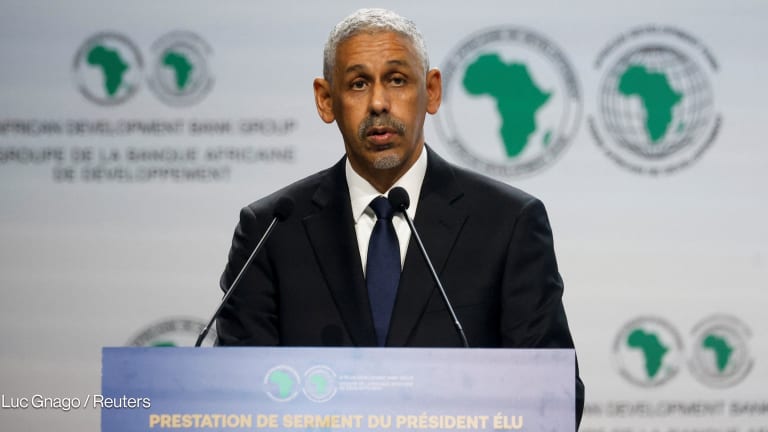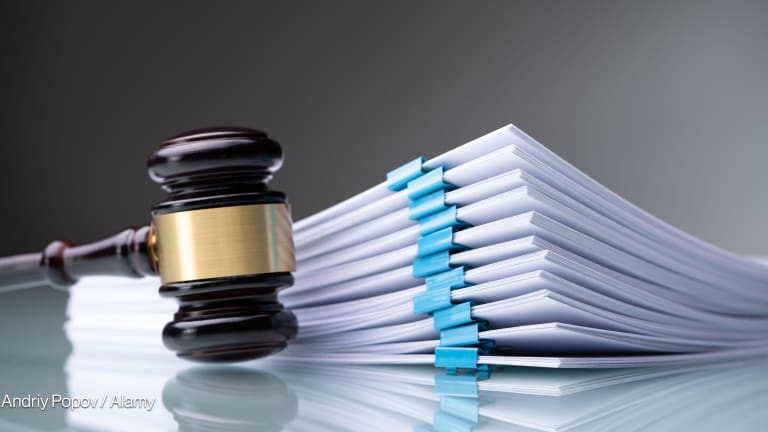What does the Adesina affair mean for AfDB?
Old tensions over power are heating up at the African Development Bank as it heads toward an election.
LONDON — The African Development Bank has offered to “compromise” with the U.S. as a dispute over corruption allegations against the bank’s president, Akinwumi Adesina, ignites old power tensions, observers say. Adesina denies the allegations against him and was exonerated by an internal review conducted by AfDB’s ethics committee in early May. But the U.S., which is the bank’s second-largest shareholder, has questioned the probe and pushed for a fresh, independent investigation. In a release published Thursday, Niale Kaba, chair of the bank's governors, said the board stood by the decision of the ethics committee and did not agree to a new investigation. However, she said it would commission an “independent review” of the report — for example, how AfDB’s ethics committee reached its decision — in “the interest of due process” and in order to “carry every Governor along.” The review will be carried out by a “neutral high calibre individual” within one month, the communique states. Experts described the move as a “compromise” intended to allow both sides to save face while balancing AfDB’s need to raise new funds — especially at a time when it is making big financial commitments for the COVID-19 response in Africa — against the views of its African shareholders. Its largest backer, Nigeria, has come out in support of Adesina, who is a former Nigerian agriculture minister. However, it is unclear whether the peace offering will satisfy the U.S. The country’s Treasury Department had not responded to a request for comment by the time of publication. It is also unclear how the review will impact Adesina’s hopes of securing a second term as bank chief in August, for which he is currently running unopposed. His reelection had looked certain after he won shareholder approval for the bank's largest-ever capital increase last year, more than doubling its capital resources to $208 billion. “Africans are outraged and infuriated by the implications. But the U.S. is the second-largest shareholder and has support from other countries.” --— Gyude Moore, senior policy fellow, Center for Global Development The Center for Global Development’s Nancy Birdsall urged the U.S. to accept the peace offering by endorsing the idea of an independent review, adding that “this U.S. administration has no standing at home or abroad on the issue of ethical behavior in public office.” Some in Africa also see the U.S. stance as a geopolitical maneuver. However, others want Adesina to be investigated. Aly Marie Sagne, head of Lumière Synergie pour le Développement, a Senegalese accountability nongovernmental organization, wants the board to put politics aside and investigate the president fully. “It’s not about regional and non-regional members against each other or African nations against western countries, it’s just a basic accountability test,” Sagne wrote in an email, adding that “such grave allegations should be handled transparently.” He also said the row could interfere with Adesina’s election hopes. “[It] won't be a blank check now for Adesina,” Sagne wrote. The announcement of an independent review comes after weeks of pressure from the U.S. and some other non-African shareholders over the bank’s handling of corruption allegations against Adesina by unnamed whistleblowers. In January, the group sent a dossier of 16 claims — including that Adesina awarded contracts and positions to friends and relatives — to the bank’s internal auditing body. Adesina was subsequently cleared by AfDB’s ethics committee, but the U.S. remained unconvinced. In a letter sent to the board in May, Treasury Secretary Steven Mnuchin said he had “deep reservations” about the “integrity” of the internal inquiry and pushed for a fresh investigation into the claims. Mnuchin’s letter sparked outcry among prominent Africans, including past and present heads of state, who rushed to Adesina’s defense in the face of what many see as a neocolonial power grab by the U.S. In a rallying letter, former Nigerian President Olusegun Obasanjo accused the U.S. of trying to hijack the bank’s governance away from Africa. Current Nigerian President Muhammadu Buhari has also said he stands by Adesina. Gyude Moore, a senior policy fellow at the Center for Global Development who previously held various roles in Liberian government, said that while the board’s compromise will disappoint Adesina’s supporters, it was inevitable considering the power dynamics at play. While voting rights at the bank are split in favor of its African borrowers — unlike with other multilateral development banks, where creditors have more of the votes — the U.S. and other donors still hold significant influence over the institution. “Mnuchin’s letter raises questions not just about the guilt or innocence of Adesina, but the integrity of the institution itself. Africans are outraged and infuriated by the implications. But the U.S. is the second-largest shareholder and has support from other countries. ... And with African countries facing recession … it’s hard to imagine how African shareholders can deny the U.S.,” Moore told Devex. “This could have been handled in … a more diplomatic way … but he who has the gold makes the rules,” Moore added. Others expressed concern about Adesina’s leadership style and AfDB’s accountability processes, describing a toxic work culture in which “criticism is not accepted internally,” according to a current staffer who spoke to Devex on condition of anonymity. Nigerian Twitter user Folake Oluokun, who said she used to work at AfDB, argued that an independent investigation could benefit the organization. “As much as I understand how much Nigerians would like to support @akin_adesina, I think that the @AfDB_Group should put their energy into ensuring that the independent investigation is truly independent. … I believe that the organisation and the continent would be better for it,” she wrote, using the Twitter handles for Adesina and the bank. An investigation could be an opportunity to strengthen accountability at the bank, agreed a former European executive director to AfDB who wished to remain anonymous to preserve professional ties. Under the current structure, the bank president is “too powerful” and is able to dominate the executive board by controlling decisions over projects, the former executive director said. AfDB has yet to release details about who will carry out the review. Daniel Bradlow, a law professor at the University of Pretoria and former chair of the roster of experts for AfDB’s Independent Review Mechanism, said he would like to have seen AfDB appoint a three-person panel to conduct the review rather than a single reviewer. “However, given their decision, I think they should appoint a highly respected African judge,” he added.
LONDON — The African Development Bank has offered to “compromise” with the U.S. as a dispute over corruption allegations against the bank’s president, Akinwumi Adesina, ignites old power tensions, observers say.
Adesina denies the allegations against him and was exonerated by an internal review conducted by AfDB’s ethics committee in early May. But the U.S., which is the bank’s second-largest shareholder, has questioned the probe and pushed for a fresh, independent investigation.
In a release published Thursday, Niale Kaba, chair of the bank's governors, said the board stood by the decision of the ethics committee and did not agree to a new investigation.
This story is forDevex Promembers
Unlock this story now with a 15-day free trial of Devex Pro.
With a Devex Pro subscription you'll get access to deeper analysis and exclusive insights from our reporters and analysts.
Start my free trialRequest a group subscription Printing articles to share with others is a breach of our terms and conditions and copyright policy. Please use the sharing options on the left side of the article. Devex Pro members may share up to 10 articles per month using the Pro share tool ( ).
Sophie Edwards is a Devex Contributing Reporter covering global education, water and sanitation, and innovative financing, along with other topics. She has previously worked for NGOs, and the World Bank, and spent a number of years as a journalist for a regional newspaper in the U.K. She has a master's degree from the Institute of Development Studies and a bachelor's from Cambridge University.








